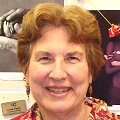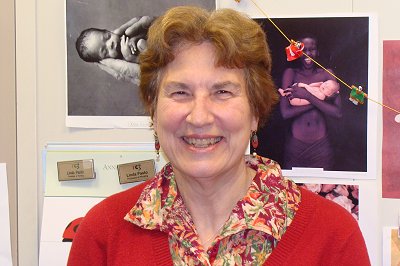- By Dan Veaner
- Around Town
 Print
Print  Linda Pasto threw a birthday party on September 1st. The Lansing woman invited students and faculty at TC3 where she teaches nursing. But it wasn't her birthday. It was the fifth anniversary of a surgery that left her without a colon, and that nearly claimed her life multiple times. Since that time she has gone on to become an inspiration to countless people, and recently won the Eastern Regional 2010 Great Comebacks® Award.
Linda Pasto threw a birthday party on September 1st. The Lansing woman invited students and faculty at TC3 where she teaches nursing. But it wasn't her birthday. It was the fifth anniversary of a surgery that left her without a colon, and that nearly claimed her life multiple times. Since that time she has gone on to become an inspiration to countless people, and recently won the Eastern Regional 2010 Great Comebacks® Award."My story is my story is my story," she says. "I share it because I hope that it helps recognize the incredible gifts that nurses have. It also helps people to understand that they can go through all that and come out on the other end and not be bitter, and not be angry. To look at the world in a different way and enjoy every day."
The award honors Pasto's remarkable attitude toward life and the variety of ways she has chosen to celebrate life and give back. Since her surgery she and a friend collected 2,200 pounds of clothes for children in Afghanistan. She became involved in a Syracuse-based ostomy support group, and visits ostomy patients in the hospital to share experiences and give support.
She was approached at a Lansing summer concert in Myers Park by a woman to ask Pasto to speak to her husband who had just had ostomy surgery. She was also one of 15 ostomy patients chosen to be filmed in a 'Living With An Ostomy' video that was developed by the United Ostomy Associations of America, Inc. to help patients understand what a full life they can look forward to after the surgery. She has also volunteered in the Lansing school system and at church.
Professionally she has presented at national conferences. A couple of years she earned national certification as a nurse educator. She is also hoping to become a certified ostomy nurse after she retires, so she can volunteer more widely in the field. But she says she may not wait until retirement.
"They're the kind of questions that people may not feel comfortable asking their doctor or even the nurse at the hospital," she says. "Some of them are pretty private and intimate kinds of questions. No question is uncomfortable for me. I feel like I have this gift and I'm able to give back."
The surgery and the events surrounding it were certainly humbling and, most of all, scary. Being a medical professional herself didn't seem to help Pasto cope with painful and embarrassing symptoms including cramps and incontinence, pain, and much worse. She was originally diagnosed in 1995 with ulcerative colitis, and was sick until last summer. Her last biopsy came back as Crohn's disease, which runs in her family.
The last two years before her surgery in 2005 she was in constant pain and discomfort. She was in denial, and also hid the severity of her condition from friends, family, colleagues and students. Then she lost 40 pounds because she couldn't hold food down for an entire month.
She had attended a wedding in Jamaica, where she picked up a GI bug. When she got back she had blood clots in her lungs. Blood thinners on top of the bug she had contracted caused hemorrhaging, and she ended up going to the hospital three times, which included steroid treatments that put the pounds back on. She was so malnourished she was hospitalized for three weeks before she was barely well enough that they could operate.
"The whole time I was thinking, 'I'm a nurse. I know what my body is supposed to be doing. Why isn't it doing that?'," she says. "I understood intellectually what was happening, but I didn't allow myself to feel anything because it was so scary. I was admitted to ICU five different times, and each time I was sure I was dying, because that's where they put people who are dying."
The lung problem has a 25% mortality rate, but she survived.
"That was my first miracle," she says. "I had multiple clots in my lungs. They looked at my scans and said they couldn't believe I survived that."
Eight days after the surgery she went into a coma that lasted a week. She went into septic shock. Her organs began to shut down, and her husband Ed was alerted that she was dying twice that week.
"One of my friends from TC3 called the President of the college to say I was dying and needed prayers," she says. 'I'm not a deeply religious person, but I felt this blanket of warmth around me. I think all those prayers -- my Mom's church in Massachusetts praying for me and my friend's family in Long Island and New york City, and locally -- the Methodist church and the Catholic church... That was my second miracle. Surviving all of that. Because I wasn't supposed to. My doctors still say it is amazing I survived. That's when I decided I had gotten a gift. That's when I decided I had to get healthy, and get my strength back and start losing weight and get more active. I was brought back from those two events that could have killed me for a reason. I needed to figure out what that reason is."
One obvious one was to continue caring for her children, and potential grandchildren that she wanted to be around for. But Pasto didn't leave it at that. She thought about how she could be a role model to inspire other people, and acted on it. She decided she wanted to let nurses know what a hugely positive impact they have on patients' lives, and to use her experiences to help her nursing students appreciate the patient's point of view.
"When I came out of that coma I could barely lift my head and I was so confused and horribly scared, and there were some of my former nursing students cheering me on," Pasto says. "It was so powerful, and I started thinking about what impact I'd had on their life to get them to that point and wanting to pay it forward. I wanted to shout to the world what wonderful miracles nurses do every day."
She attacked life on two fronts. One was to take care of herself, the other to help others. She started working out and lost 100 pounds. She also seems to have lost any inhibitions she may have had about talking about the intimate kinds of challenges ostomy patients face.
 Linda Pasto
Linda PastoPasto uses her own experience as a teaching lab. She uses her case studies, lab results, the emotions she went through as she almost died more than once -- everything, no holds barred. In the ostomy video she overcame her shyness about her body to film one scene in a bathing suit at a pool to help give other patients who are not of the catalog-model body type the confidence to swim after their own surgery. She says this personal approach makes a greater impact on her students and colleagues.
"I'll talk to anybody who will listen," she says. "The hospital had me be their keynote speaker for National Nurses' Week the year after my illness. And when I received the award in October I got to speak to a whole room full of nurses."
The small intestine digests food. The large intestine is responsible for fluid, sodium, and potassium reabsorption. Without a colon your kidney have to work much harder, as the only mechanism left that reabsorbs water, and it leaves you more vulnerable to developing kidney stones. That means a lot of water is lost, and to make up for it Pasto has to drink at least two liters of fluids per day.
While living without a large intestine presents daily challenges Pasto says the considers herself a healthy person today. She is the kind of person that is so great to talk to that you look for excuses to prolong the conversation. She is upbeat and has avoided being bitter about her experience.
"I've never asked, 'why me?' I've never gotten angry about what happened," she says. "I get up many days, even if it's pouring rain."
Winning the award means a lot to Pasto, in part because of the opportunities it affords her to tell her story and help fellow nurses understand what a significant impact they have.
"I don't think I understood what a big deal it was. I was thrilled to receive the award. From the movement I got there there was a person to take care of me while I was there. I felt like a celebrity. There was a huge board with my picture and information on it, and a professional photographer was taking pictures of my husband and I. After the presentation they had an exhibitor's hall. About 25 nurses came up and said, 'Can I give you a hug? Your speech meant so much to me."
She also didn't realize that she would be part of the national conference in New Orleans next June. She and the other three regional winners will be presented in a formal ceremony, and 'This Is your Life' style videos of each will be shown, after which the national winner will be announced. Pasto says she wants to make sure they film part of her video at Cayuga Medical Center and TC3 when the film crew comes to Lansing in the spring.
"My nursing and my teaching are my big passions," she says. "That's what they should be seeing."
Meanwhile she continues to make as big an impact as she can, but sees her life and life in general very differently.
"One of my favorite things right now is I love standing in line," she says. "Because I can stand in line. Five years ago I was in a coma and not expected to live. I'm so glad that I can be in a line and start talking to people and find out interesting stories about them. I also use it in my teaching to say what's really important in life? What really matters? A lot of things that used to bother me just don't bother me. Things that used to overwhelm me -- I just don't let them."
----
v6i47



